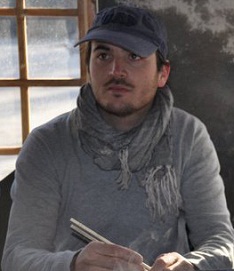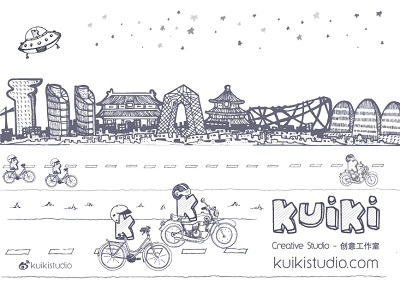BEIJING | Kuiki Studio has found in Asia the opportunity to develop a business model not possible if it were based in Spain. In just 6 months the internet solutions company Kuiki Studio ceased to be a project in the minds of a small group of friends to become a Spanish company based in Hong Kong, with clients across Asia and Europe and having a 10% of the company owned by the Internet cluster IT&IS.
Its 29 years old CEO and creative director, Pedro Moreno, points out that they decided to base their operations in China because they spotted a weakness in the region regarding investment activity in design and audio-visual projects. They transformed this room for opportunity into a creative laboratory, making of Kuiki a creative studio aimed at bringing creativity to the brink. Kuiki Studio’s goal is to keep on experimenting in order to find internet solutions that are creative both in the technical sphere and in the visual one.
Kuiki’s success wouldn’t had been possible if it were based in Spain, Pedro acknowledges. Facing the challenge of starting from scratch in Asia was the key to a business model that takes the most of the opportunities internet has to offer. Being in Asia and having a team based across the continent in countries such The Philippines, Indonesia, India, China and Spain allows Kuiki, not only to get to know their clients locally, but to work 24/7 offering solutions to their clients even before they wake up.

What is Kuiki Studio? Kuiki is a company that offers creative solutions within the field of graphic design, technology, communications and smart phones.
What took you to leave Spain for China? Were they professional or personal impulses? We knew the Spanish market and we thought we knew what we wanted to offer: web projects. That is how we started considering the option of stepping into the Asian market. It is a continent with a huge interest for visual solutions. Even though their creative education is different they are mainly focused in visual Western models. We saw an opportunity and decided to finally base Kuiki in Hong Kong, an efficient port from which to expand our operations across the continent seeking projects in The Philippines and Vietnam.
All these in just 6 months, tell us how? We are making extensive use of what we know with regard to our activity as well as of everything we learn. We never stop exploring or learning. The employee and client structure that we have would have been impossible without the Internet. So what we do is to make extensive use of Internet 2.0. Our foundation is to make use of all the possibilities aroused from the fact that we have partners across Asia and in Spain, which helps us open up the range of resources and clients. Our studies are important too. We have a diversity of backgrounds: from technology, to economics and design. To put it simple: geographical delocalization, different professional profiles and the Internet.
How do you recruit your employees and contributors across the continent? We were aware of these popular websites among Asians aimed at recruiting personnel. These sites are like online social networks were potential employees can apply for specific projects, according to their background. We try to move away from this. For instance by recruiting people who won programming contests. Even though they might have some creative deficiencies, they go well beyond the standards when it comes to their technical knowledge and their ability to give technical solutions.
Could we say that a vital need for experimentation brought you to base your operations in Asia? Yes, and in the particular case of Kuiki Lab this is of special significance. Our creative laboratory doesn’t give us economic revenues, we experiment in order to use what we learn in future projects with our clients. Some of the projects that we have in Asia are simply our very own projects because they won’t have direct economic impact. Our desire of experimenting in Asia allows us to understand what the Chinese market wants or likes in our sector, and we reapply it in our clients. The cycle is always closed in this sense.
How a Western internet solutions company finds its way in
a country with huge internet restrictions and with most of the widely used Western tools are blocked? The first mistake we made was trying to simply adapt our knowledge into this new market. We simply realised that we couldn’t just apply our knowledge to a new client. One must understand everything it has been asking for, everything that this society wants. It’s important to understand very well what this culture has been doing until nowadays and how we, as a company, had the opportunity to bring something new. The way to do this is by working with local employees who should also understand your concept and the way you work.
Is, then, starting from scratch paramount? Not really starting from scratch. Let’s say is not only a matter of adapting all your knowledge but to comprehend the culture and the society of your new client. It’s more than an adaptation exercise, it’s a matter of understanding and blending into the environment. One should not stop being one self but at the same time one should not loose track of the fact that one is in China. Getting to know the place were you are is crucial.
What was the major challenge Kuiki had to face? Sometimes one needs to spend more time negotiating the terms of the project than working on the project itself. These timings are tough for a young company that is starting to have its very own portfolio. We were not used to have such long negotiations and it was challenging because it slows the growth of the company.
What features move Kuiki away from the traditional business model? Both in Europe and in Asia we are a not a so common enterprise because we try to gain a knowledge on the societies of both continents in order to deliver fast and low cost solutions worldwide. I think it makes us stronger to have a part of the company in Asia and the other one in Europe.
What’s your competitive edge: knowledge or low cost solutions? We apply a high dose of creativity, specially in the local projects we have in Asia, and our low cost structure allows us to be very competitive and fast. We are now developing the projects in record time, I would say. In other words, our competitive edge is high technical creativity compared to the standards in Asia, our speed in developing projects and low cost.
What is Kuiki experimenting on now? What’s next? Our goal was to reinvest everything into our laboratory. All the capital we earned has been invested in I+D+I in order to learn more and deliver projects with higher quality. Now, the next step is to increase our capital in order to have a sound presence in the countries we already have a representation. We have had a very good start, but what we want now is to stabilize the flow of projects that we have.
PRESENTATION CARD
Company: Kuiki Studio (http://www.kuikistudio.com)
Activity: Kuki is a studio that merges disciplines such Graphic Design, Web programming, Online marketing, multimedia editing, Smart phone Apps and Corporate Design. Its wide range of Internet solutions are developed thanks to the fact that it operates trying to make the most of the possibilities the Internet has to offer. Kuiki's goal is to apply creative solutions both in the graphic and in the technical sphere.
Employees: Four partners (based in Spain and China) and three local employees as well as a network of freelancers in Indonesia, China, India and The Philippines. They have profiles such designers, writers, programmers and illustrators, among others.
Clients: Spanish Embassy in the P. R. China, Instituto Cervantes Pekín, Saigonbutler in Vietnam and Royal Seal Media International in Beijing, among others.
Entrepreneur’s background:
Bachelor’s in Advertising and Public Relations by Universidad de Alicante, Master’s in Advertisement Graphic Design by the Fine Arts Schools in Alicante and Master’s in Teacher training. He worked for the communication consultancy group Idex and he was the director of the communication department of Tescoma in Spain. During his two years in Beijing he worked in the Tourism industry and as a graphic designer for Lee Cooper. He contributed to Chinaempleo.com advising on communication issues and since Kuiki was formally founded he is devoted to the project.





